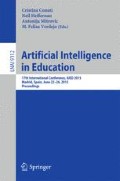Abstract
Dynamic communication between Teachable Agents (TA) and students is crucial for educational effectiveness of the TA, as dynamic interaction is the vital part throughout the teaching and learning processes. Existing TA design mainly focuses on the functions and features to ensure the TA to be taught by students rather than bi-directional interaction. However, according to reciprocity theory in social psychology, if the TA can offer friendly actions, students in response will be much more cooperative and motivated. In order to improve quality of communication and seize the interest of students, we propose a need modeling approach to enable TAs to have “intrinsic motivations”. In this way, the TA can proactively carry out dynamic communication with students so that the TA can adapt to students’ changing behaviors and sustain a good human-agent relationship. Our field study showed that students were highly attracted by the TA with dynamic needs. They statistically completed more tasks. Also, better results were obtained on students’ learning efficiency and attitude towards TA’s informational usefulness and affective interactions.
Access this chapter
Tax calculation will be finalised at checkout
Purchases are for personal use only
Preview
Unable to display preview. Download preview PDF.
References
Biswas, G., Leelawong, K., Schwartz, D., Vye, N., Vanderbilt, T.: Learning by teaching: A new agent paradigm for educational software. Applied Artificial Intelligence 19, 363–392 (2005)
Woolf, B.P.: Building intelligent interactive tutors: Student-centered strategies for revolutionizing e-learning. Morgan Kaufmann (2010)
Singh, S., Barto, A.G., Chentanez, N.: Intrinsically motivated reinforcement learning. Pa-per presented at the In: Proc. of the 18th Annual Conf. on Neural Information Processing Systems (NIPS 2004) (2005)
Zhao, G., Borjigin, A., Shen, Z.: Learning-by-Teaching: Designing Teachable Agents with Intrinsic Motivation. Educational Technology & Society 15, 62–74 (2010)
Singh, S., Lewis, R.L., Barto, A.G., Sorg, J.: Intrinsically motivated reinforcement learning: An evolutionary perspective. IEEE Transactions on Autonomous Mental Development 2(2), 70–82 (2010)
Matsuda, N., Yarzebinski, E., Keiser, V., Raizada, R., Cohen, W.W., Stylianides, G.J., Koedinger, K.R.: Cognitive anatomy of tutor learning: Lessons learned with SimStudent. Journal of Educational Psychology 105(4) (2013)
Biswas, G., et al.: Measuring Self-Regulated Learning Skills through Social Interactions in a teachable Agent Environment. Research and Practice in Technology Enhanced Learning 5(2), 123–152 (2010)
Azevedo, R., et al.: The Effectiveness of Pedagogical Agents’ Prompting and Feedback in Facilitating Co-adapted Learning with MetaTutor. In: Cerri, S.A., Clancey, W.J., Papadourakis, G., Panourgia, K. (eds.) ITS 2012. LNCS, vol. 7315, pp. 212–221. Springer, Heidelberg (2012)
Segedy, J.R., Kinnebrew, J.S., Biswas, G.: Investigating the relationship between dialogue responsiveness and learning in a teachable agent environment. In: Biswas, G., Bull, S., Kay, J., Mitrovic, A. (eds.) AIED 2011. LNCS, vol. 6738, pp. 547–549. Springer, Heidelberg (2011)
Baranès, A., Oudeyer, P.Y.: R-IAC: Robust intrinsically motivated exploration and active learning. IEEE Transactions on Autonomous Mental Development 1(3), 155–169 (2009)
Merrick, K.E.: A comparative study of value systems for self-motivated exploration and learning by robots. IEEE Transactions on Autonomous Mental Development 2(2), 119–131 (2010)
Baylor, A., Ryu, J.: The API (Agent Persona Instrument) for assessing pedagogical agent persona In: World Conference on Educational Multimedia, Hypermedia and Telecommunications, pp. 448-451 (2003)
Author information
Authors and Affiliations
Corresponding authors
Editor information
Editors and Affiliations
Rights and permissions
Copyright information
© 2015 Springer International Publishing Switzerland
About this paper
Cite this paper
Borjigin, A., Miao, C., Lim, S.F., Li, S., Shen, Z. (2015). Teachable Agents with Intrinsic Motivation. In: Conati, C., Heffernan, N., Mitrovic, A., Verdejo, M. (eds) Artificial Intelligence in Education. AIED 2015. Lecture Notes in Computer Science(), vol 9112. Springer, Cham. https://doi.org/10.1007/978-3-319-19773-9_4
Download citation
DOI: https://doi.org/10.1007/978-3-319-19773-9_4
Published:
Publisher Name: Springer, Cham
Print ISBN: 978-3-319-19772-2
Online ISBN: 978-3-319-19773-9
eBook Packages: Computer ScienceComputer Science (R0)

